Yup.
I’m going down the coronavirus rabbit hole.
Bear with me, as I know you’ve heard a lot.
But I want to fill you in on the facts and how it affects you as a traveler — or potential traveler.
And I’m going to get all science/fact based on you about COVID-19, coronavirus’ official name.
But I will preface this that I am no scientist or epidemiologist.
What I am is a consumer of good, fact-based information that I then try to share with you.
And I consider myself to be a thorough researcher of good travel information.
So…
You want to know if you should still travel to Europe in this time of COVID-19.
And the answer is…
It depends.
There are considerations.
But first I want to dispel some myths about this virus and get some facts straight.
Because there’s a lot of bad, overblown and misinformation out there.
What you need to know about coronavirus
So what are the symptoms of coronavirus?
According to the WHO (World Health Organization), “The most common symptoms of COVID-19 are fever, tiredness, and dry cough. Some patients may have aches and pains, nasal congestion, runny nose, sore throat or diarrhea. These symptoms are usually mild and begin gradually. Some people become infected but don’t develop any symptoms and don’t feel unwell. Most people (about 80%) recover from the disease without needing special treatment. Around 1 out of every 6 people who gets COVID-19 becomes seriously ill and develops difficulty breathing. Older people, and those with underlying medical problems like high blood pressure, heart problems or diabetes, are more likely to develop serious illness. About 2% of people with the disease have died. People with fever, cough and difficulty breathing should seek medical attention.”
So if you have these symptoms, which are very similar to a cold or the flu, then you should see a doctor.
And note those last few sentences about older folks and people with underlying medical problems.
This is something key to this virus in who it affects and how it affects them.

If you have a fever, you definitely want to seek medical attention.
How does COVID-19 spread?
Again, I’m turning to the trusted WHO.
This is what their website says, “People can catch COVID-19 from others who have the virus. The disease can spread from person to person through small droplets from the nose or mouth which are spread when a person with COVID-19 coughs or exhales. These droplets land on objects and surfaces around the person. Other people then catch COVID-19 by touching these objects or surfaces, then touching their eyes, nose or mouth. People can also catch COVID-19 if they breathe in droplets from a person with COVID-19 who coughs out or exhales droplets. This is why it is important to stay more than 1 meter (3 feet) away from a person who is sick.”
They are continuing to research this so they are finding out more and more about this pesky virus.
However, one big question is whether this virus can spread through air.
As of now, they are saying no, stating, “Studies to date suggest that the virus that causes COVID-19 is mainly transmitted through contact with respiratory droplets rather than through the air.”
How likely are you to catch this virus?
This depends.
It’s really the law of averages.
If you are in an area where many folks have coronavirus, then yes, you are at greater risk.
This is the same for the flu.
And if you decide to travel to an area with a high percentage of folks that have the virus, then yes, your risk is greater.
However, even if you are in an area where there is an outbreak, if you are healthy you may not get the virus or simply get a mild case of it.
Remember: 80% of cases are mild.
And if you are a healthy person, you are less likely to catch the virus at all or to contract a severe case of it.
The coronovirus is not going to kill you — unless you already have some health issues and/or are elderly.
This isn’t a “you’re going to die if you catch this” virus.
More than likely, you’re not.
In fact way more than likely.
I’d also like to note that children do NOT seem to be overly susceptible to COVID-19 — unlike the flu.
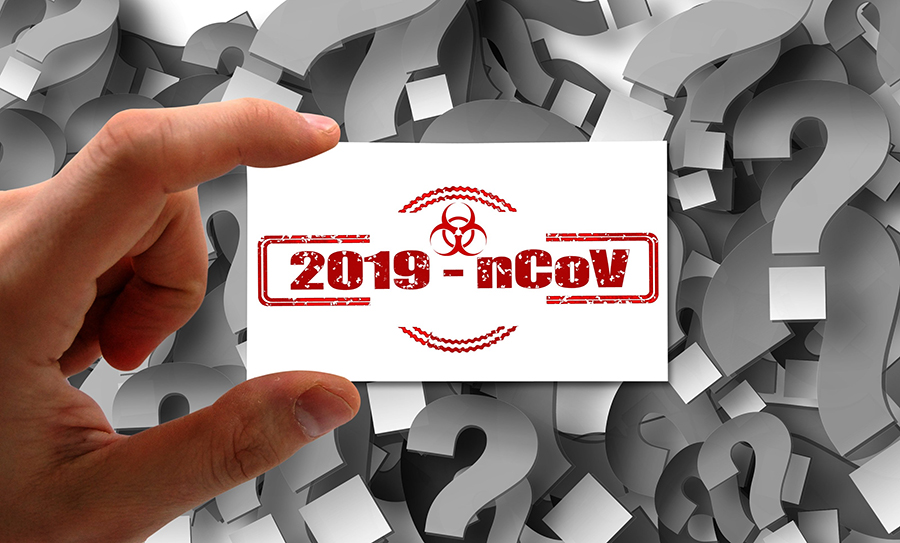
There are lots of questions about this virus. I hope this post answers some of these Q’s.
How does COVID-19 compare to the flu?
According to Johns Hopkins here’s what we have so far:
Infections:
COVID-19: Approximately 90,279 cases worldwide; 100 cases in the U.S. as of Mar. 2, 2020.
Flu: Estimated 1 billion cases worldwide; 9.3 million to 45 million cases in the U.S. per year.
Deaths:
COVID-19: Approximately 3,085 deaths reported worldwide; 6 deaths in the U.S., as of Mar. 2, 2020.
Flu: 291,000 to 646,000 deaths worldwide; 12,000 to 61,000 deaths in the U.S. per year.
It is also thought that the flu virus is actually stronger than COVID-19.
And, here’s something I didn’t know for sure before doing this research, the coronavirus is caused by just one virus whereas the flu is caused by several different types and strains of the influenza virus.
This is what makes the flu easier to catch than the coronavirus.
The best ways to prevent catching coronavirus
Wash your damn hands!
And don’t touch your face!
Think about all the things health care professionals tell you regarding the flu or even the common cold.
This applies to COVID-19.
So let’s list them out to get them into that brain of yours.
- Wash your hands (it bears repeating!) with soap and warm water for a good 30 seconds.
- If you can’t get to a sink to do this, then use alcohol based hand sanitizer.
- Sanitize work places regularly. Think about shared phones, drawer handles, keyboards, desktop/counter surfaces. Use disinfectant wipes or cleaners to wipe everything down.
- Keep your distance from someone who is sneezing or coughing — about 3-5 feet/1 to 1.5 meters.
- Avoid touching your face — eyes, nose, mouth. It’s easy for those fingers to pick up something from a surface then transfer it to you this way.
- Cover your mouth when you sneeze or cough. It’s preferable to use a disposable tissue, however if you don’t have one, then use your bent elbow. Just be sure to wash that piece of clothing sooner versus later!
- You don’t need a mask. Unless you are sick, a mask is NOT going to keep you from getting coronavirus — or the flu or the common cold. It will, however, keep you from spreading your nasty germs if you are sick.
- Stay home if you are feeling unwell! Read that again. If you do not feel well don’t go out…to work, school, the supermarket, the gym, your friend’s house. STAY HOME!
So let’s move onto the travel part of this article.
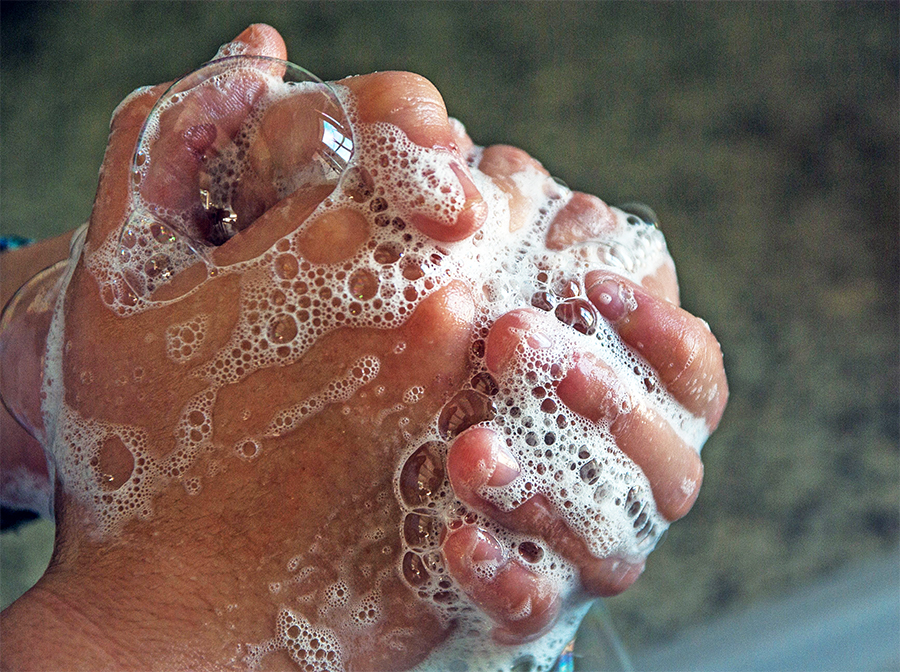
Wash your hands!! This is the best way to keep you from catching COVID-19 or any other virus like the flu.
Should you stay or should you go?
Anyone else singing that awesome song by The Clash right now?
Seriously though.
Should you travel during this whole coronavirus scare?
I think this depends.
But mostly my answer is YES.
However let’s break down some factors that you should take into consideration.
Your age and your health
Are you a healthy 30- or 40-something?
Or a healthy mid-50 something like yours truly (I can’t believe I just called myself mid-50 something 😩)?
Then by all means, go.
Your chances of getting a severe case of coronavirus are very rare.
And you probably won’t catch it at all if you do all those things above in the prevention section.
If you are over 65, then you might reconsider.
For instance, if you are a fit, healthy 65-75 year old then I might still go.
If you are not so healthy, then reconsider a bit more.
Do you have underlying health issues such as diabetes or heart issues?
Then it might be wise NOT to make that trip at this time.
Unsure?
Consult with your doctor so you can make the right call for you.

I’m an active, healthy 50-something so I feel comfortable traveling.
Where are you traveling?
There are those areas in the world that do have a higher rate of coronavirus infections.
Mostly, Europe — which is what Wander Your Way is all about — is not seeing a big outbreak.
Except of course, parts of Italy.
And see what I did there — I said “parts” of Italy.
Not the entire country.
There are towns in the regions of Lombardy, the Veneto and Emilia-Romagna that have the most cases.
But, according to some local news sources, the number of cases is leveling off a bit.
As of March 3, of the 2,036 reported cases in Italy, 149 have fully recovered.
52 cases that resulted in death, are in folks with underlying health issues.
Of the remaining 1,835 people in Italy who currently have the virus, 927 have only mild symptoms and are at home in self-quarantine.
742 are receiving treatment in hospital, while another 166 are in intensive care.
Again, it’s the elderly and those with underlying health issues that have the severe cases.
Now the CDC (Centers for Disease Control which is strictly a US organization) has put Italy at a Level 3 meaning you should avoid non-essential travel to this country.
I’m no expert, but it seems to me that this might be a bit too much as it says ALL of Italy.
However, I’d say use your judgement when it comes to Italy.
Personally, if this was last year when I was getting ready to travel to Italy, I’d still go.
No matter where in Italy.
But I’m a very healthy 50-something.
If you are thinking of traveling elsewhere in Europe, I’d still go — as long as you are a healthy, young to middle-aged person.
The WHO has absolutely NO travel bans or travel restrictions in place and actually they see these as potentially harmful as it can restrict much needed aid to affected areas.
This is a great resource on international traffic.
Here’s a piece of it that caught my eye — but do read the entire page.
Travel bans to affected areas or denial of entry to passengers coming from affected areas are usually not effective in preventing the importation of cases but may have a significant economic and social impact. Since WHO declaration of a public health emergency of international concern in relation to COVID-19, and as of 27 February, 38 countries have reported to WHO additional health measures that significantly interfere with international traffic in relation to travel to and from China or other countries, ranging from denial of entry of passengers, visa restrictions or quarantine for returning travellers. Several countries that denied entry of travellers or who have suspended the flights to and from China or other affected countries, are now reporting cases of COVID-19.
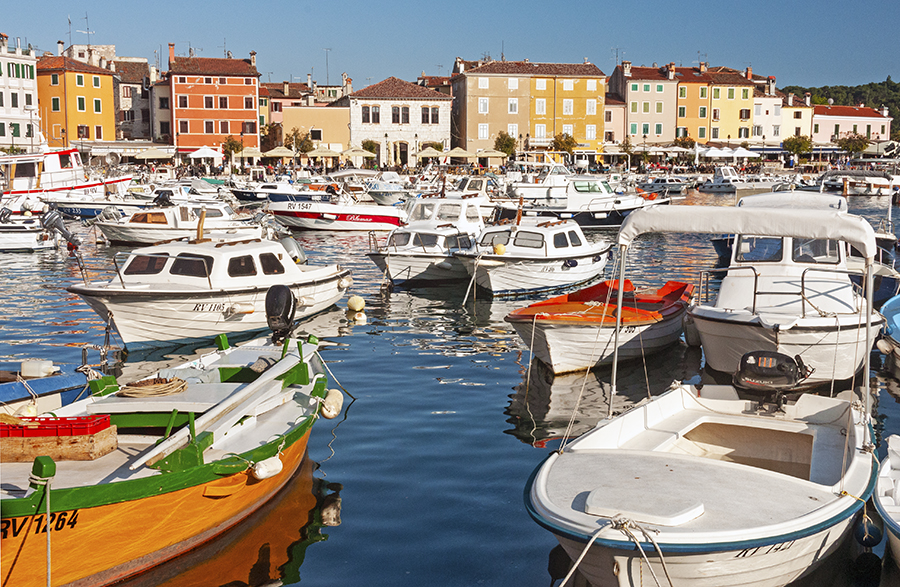
Europe, in general, has not seen a lot of COVID-19 cases. Although there have been more cases in Italy. However, I’d still travel anywhere in Europe as a healthy traveler. Photo of Rovinj, Croatia.
Will travel insurance cover my trip if I cancel due to COVID-19?
Nope.
Unless you have cancel for any reason you won’t be reimbursed the money you spent on your trip.
Now if you have travel medical insurance and get sick while you’re traveling, you should get some coverage for that.
This will depend on your policy.
But if you decide to cancel your trip and don’t have the cancel for any reason added on — which will cost about double regular travel insurance — then you’re screwed.
The whole quarantine upon return to the US
So I know some folks who put off a trip to Italy as they were more concerned about being quarantined upon return to the US.
I get this.
It’s certainly possible that if you were to return from Italy — especially an infected region —you could be subjected to a quarantine even if you don’t have any symptoms.
And some folks just can’t do this.
My recommendation is to check the WHO, CDC and the Customs and Border Patrol (for US citizens) websites as this will be a developing situation.
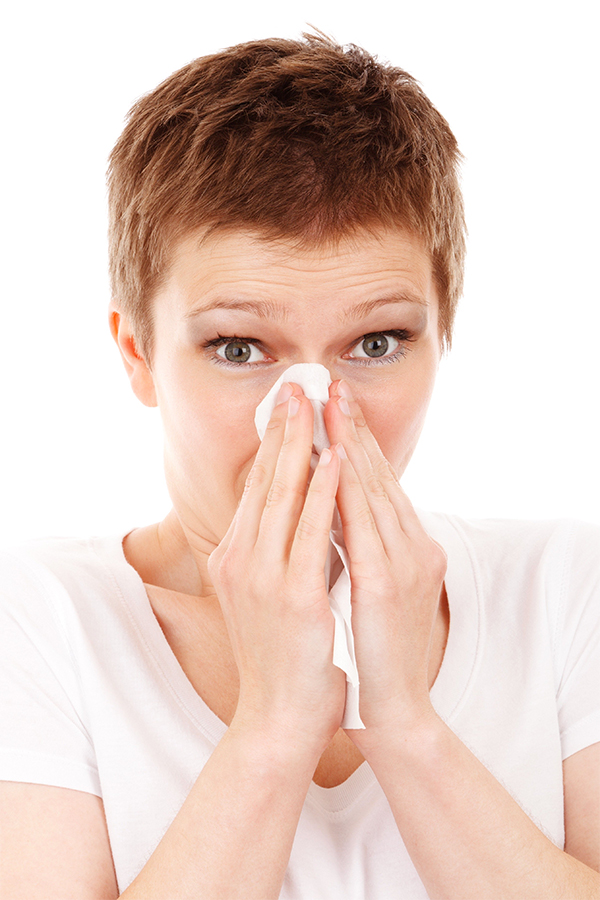
Use disposable tissues or toilet paper to cover your nose and mouth when you sneeze or cough.
I’m afraid of being on an airplane or in crowded places
So upon doing this research I learned a few things.
One tip I caught from my favorite news source, NPR (National Public Radio), is that the air they blow out on the planes — you know that air that blows down on you making you freeze your ass off — is good at filtering out the nasty germs in planes.
So airplanes have a good air filtering system.
The big thing is just to watch what you touch, keep your hands clean, and keep your fingers off your face.
And to keep your distance from someone who is coughing or sneezing.
Now, in a plane or a train, this can be difficult if not impossible.
I will say this again though, wash your hands or use hand sanitizer and do NOT touch your face.
These 2 things are the best prevention measures you can take.
And if YOU are not feeling well, then, by all means, do not travel and risk infecting others.
Here are a couple of concise, easy to read documents that provide some good information.
How-to-Prevent-the-Fear-of-Coronavirus-From-Spreading
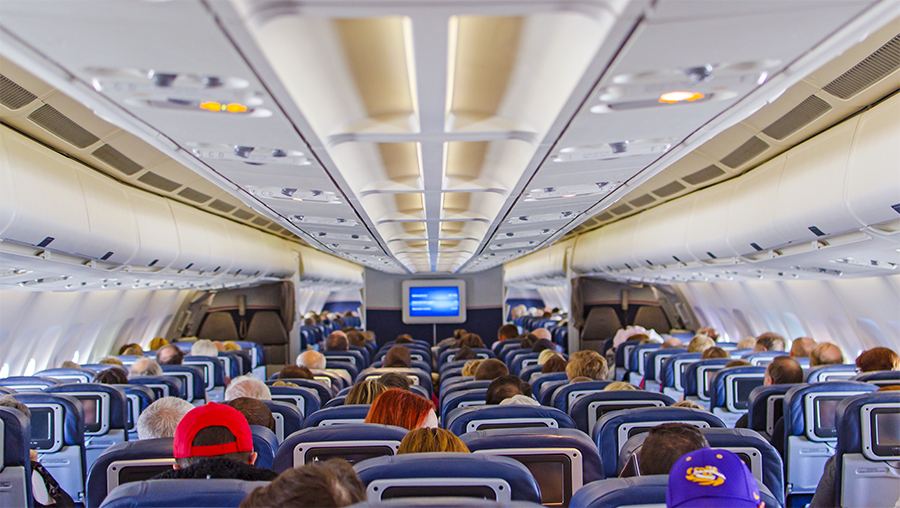
Airplanes do a pretty good job of keeping the air clean. But you also need to be diligent about hand washing and not touching your face.
Travel and the coronavirus
Here’s the thing: this virus is out there and there’s no real containing it at this point.
Will you catch it?
Maybe.
Although you’d have a better chance of contracting the flu or a common cold.
More than likely you won’t catch COVID-19.
Certainly if you are older or have some underlying health issues you should reconsider traveling.
But please don’t be afraid to travel.
Because there’s really not much to be concerned about — at least not at this point.
It is an evolving situation that I feel will get better as the health professionals understand this virus better and begin to develop a vaccine for it.
For now, be diligent about hand washing.
Use hand sanitizer if you can’t wash with soap and water.
Keep your distance from people who are coughing and sneezing.
Do not touch your face.
Eat healthy.
Get your rest.
And now might be a good time to take that nature trip to Europe.
Or maybe to visit those off the tourist track, lesser-visited (hint: fewer germ-y people) destinations.
After all you’ll be around fewer people so you’ll be less likely to pick up a virus — or any other germs!
As always, I welcome any feedback.
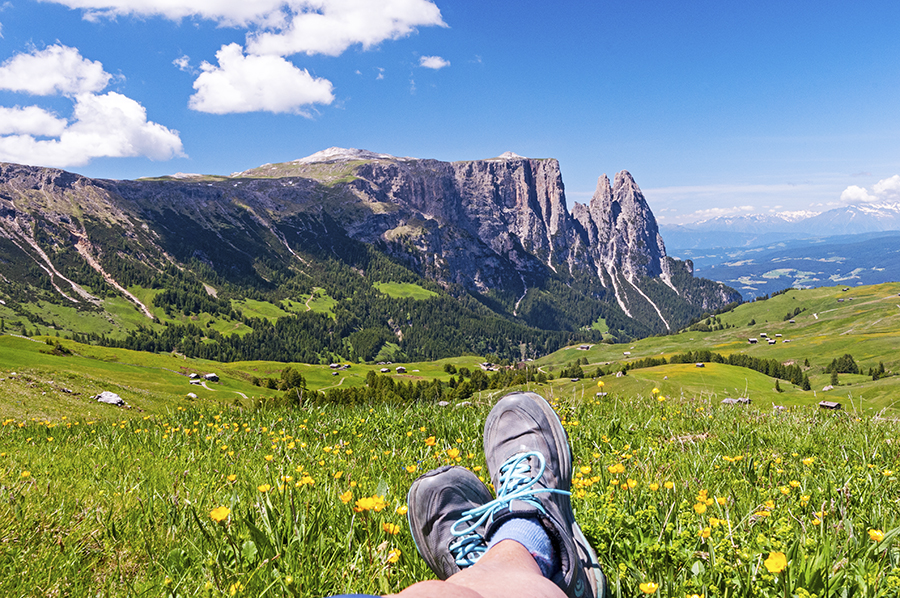
Maybe it’s time for that nature trip to Europe?! Photo of my feet in Alpe di Siusi, Italy.
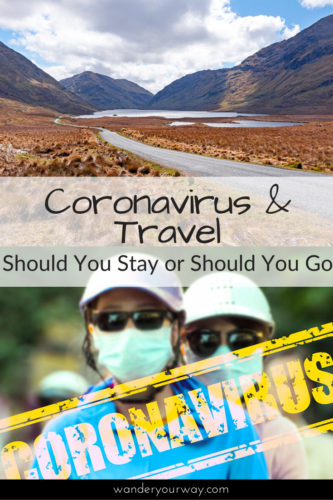

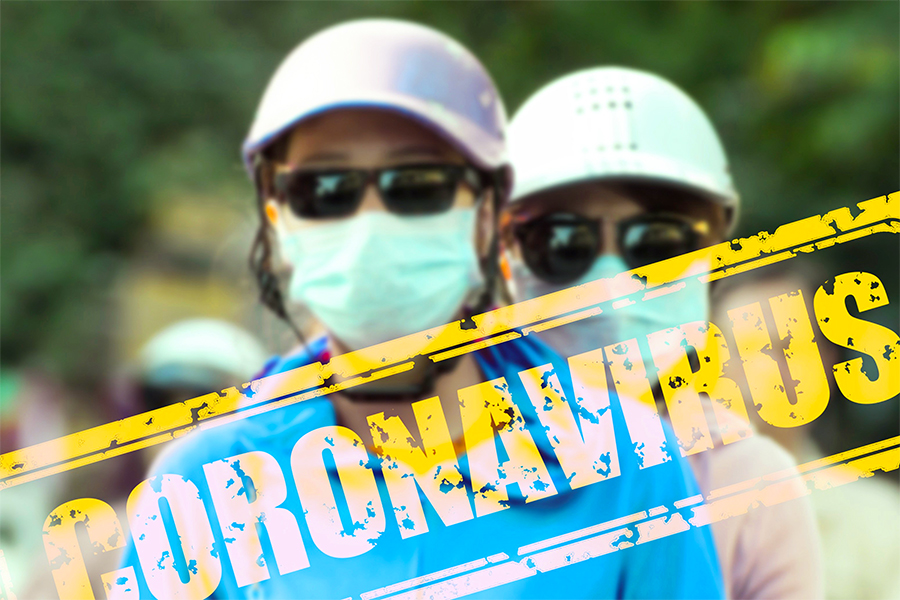






Thank you, thank you, thank you. Our trip to Italy is not until September, but we have been following the news. We’re seniors but are for the most part healthy. I say most part because we came back from Ireland last October with a case of the flu that lasted 8 weeks!
We’re hoping that by September all countries will have better control of this virus.
It’s scary times made all the more frightening by how much bogus information is being circulated.
I thank you for doing such thorough research. I’ll pass it along.
Happy, healthy, and safe travels,
Dayle
You’re so welcome, Dayle. I am hopeful that by September things will be under control. And, yes, the flu seems to be a more pesky virus. COVID-19 is just a bit of an unknown — and that is what freaks people out. Keep yourself healthy, Dayle, and wash your hands! 😉